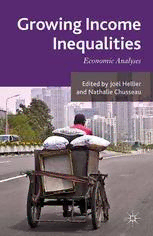
Growing Income Inequalities: Economic Analyses PDF
Preview Growing Income Inequalities: Economic Analyses
Growing Income Inequalities This page intentionally left blank Growing Income Inequalities Economic Analyses Editedby Joël Hellier ProfessorofEconomics,UniversityofNantes and Nathalie Chusseau AssociateProfessorofEconomics,UniversityofLille1 ©EditorialandSelectionMatter©JöelHellierandNathalieChusseau2013 IndividualChapters©Contributors2013 Softcover reprint of the hardcover 1st edition 2013 978-0-230-30342-3 Allrightsreserved.Noreproduction,copyortransmissionofthis publicationmaybemadewithoutwrittenpermission. Noportionofthispublicationmaybereproduced,copiedortransmitted savewithwrittenpermissionorinaccordancewiththeprovisionsofthe Copyright,DesignsandPatentsAct1988,orunderthetermsofanylicence permittinglimitedcopyingissuedbytheCopyrightLicensingAgency, SaffronHouse,6–10KirbyStreet,LondonEC1N8TS. Anypersonwhodoesanyunauthorizedactinrelationtothispublication maybeliabletocriminalprosecutionandcivilclaimsfordamages. Theauthorshaveassertedtheirrighttobeidentifiedastheauthorsofthiswork inaccordancewiththeCopyright,DesignsandPatentsAct1988. Firstpublished2013by PALGRAVEMACMILLAN PalgraveMacmillanintheUKisanimprintofMacmillanPublishersLimited, registeredinEngland,companynumber785998,ofHoundmills,Basingstoke, HampshireRG216XS. PalgraveMacmillanintheUSisadivisionofStMartin’sPressLLC, 175FifthAvenue,NewYork,NY10010. PalgraveMacmillanistheglobalacademicimprintoftheabovecompanies andhascompaniesandrepresentativesthroughouttheworld. Palgrave®andMacmillan®areregisteredtrademarksintheUnitedStates, theUnitedKingdom,Europeandothercountries ISBN 978-1-349-33811-5 ISBN 978-1-137-28330-6 (eBook) DOI 10.1057/9781137283306 Thisbookisprintedonpapersuitableforrecyclingandmadefromfully managedandsustainedforestsources.Logging,pulpingandmanufacturing processesareexpectedtoconformtotheenvironmentalregulationsofthe countryoforigin. AcataloguerecordforthisbookisavailablefromtheBritishLibrary. AcatalogrecordforthisbookisavailablefromtheLibraryofCongress. 10 9 8 7 6 5 4 3 2 1 21 20 19 18 17 16 15 14 13 12 To Nicolas Bauduin, who was passionately fond of the research on inequalities This page intentionally left blank Contents ListofTables xiii ListofFigures xiv NotesonContributors xvi IntroductionandOverview 1 JoëlHellier PartI WhereDoWeStand?WhyIsItSo? 11 1 GrowingIncomeInequalitiesinAdvancedCountries 13 NathalieChusseauandMichelDumont 1.1 Introduction 13 1.2 Stylizedfacts 14 1.2.1 Growingwageinequality 15 1.2.2 Growingincomeinequality 16 1.2.3 GlobalizationandNorth–Southtrade 18 1.2.4 Amajortechnologicalchange 20 1.2.5 Changesinlabourmarketinstitutions:more flexibility 20 1.2.6 Changesinthelaboursupply:ageneralskill upgrading 20 1.3 Thedemand–supply–institutionframework 22 1.4 Thethreeexplanationsandtheirempiricalrelevance 24 1.4.1 North–Southtradeandglobalization 25 1.4.2 Exogenousskill-biasedtechnologicalchange 32 1.4.3 Changesin(labourmarket)institutions 34 1.4.4 Taxes 36 1.5 Combinedexplanations 36 1.5.1 Trade-inducedtechnologicalchange 37 1.5.2 Skillsupply-inducedtechnologicalchange 37 1.5.3 Institution-inducedtechnologicalchange 38 1.5.4 Technology-inducedoffshoring 38 1.5.5 Labourmarketpolarizationandtrade-in-tasks models 39 1.6 Concludingremarks 40 vii viii Contents 2 InequalityinEmergingCountries 48 NathalieChusseauandJoëlHellier 2.1 Introduction 48 2.2 Inequalityinemergingcountries:whatthe datasay 50 2.2.1 Asiancountries 50 2.2.2 LatinAmerica 52 2.2.3 Otheremergingcountries 53 2.2.4 Aninconclusivediagnosis 54 2.3 Traditionalexplanations:Kuznetsversus Heckscher–Ohlin 55 2.3.1 Kuznets’prediction:theinverted-U inequalitycurve 55 2.3.2 TheHOSprediction:decreasinginequality 56 2.3.3 Thecombinationofbothexplanations 57 2.4 Newexplanations 58 2.4.1 Thecorneringofnewskill-intensivegoods 58 2.4.2 Technologicaltransfers 59 2.4.3 Changesinthesectoralstructurewith non-tradablegoods 60 2.4.4 FDIandcapitalimportsfromtheNorth 61 2.4.5 Intermediateemergingcountries 62 2.4.6 GrowingSouthandtechnological catchingup 62 2.4.7 Assessment 63 2.5 Empiricalevidence 64 2.5.1 Methods 64 2.5.2 AssessingtheKuznetshypothesis 66 2.5.3 Overallestimations 66 2.5.4 Asiancountries 68 2.5.5 LatinAmerica 70 2.5.6 Othercountries 70 2.6 Conclusion 71 3 TheWorkingPoor 76 EkaterinaKalugina 3.1 Introduction 76 3.2 Theworkingpoor:definitions 78 3.2.1 Povertyandactivity 78 3.2.2 Thetwo-leveldefinitionofin-workpoverty 80 3.2.3 AmericanversusEuropeandefinition 80 Contents ix 3.3 Empiricalanalyses:dataandmethods 82 3.3.1 Data 83 3.3.2 Methods 84 3.3.3 Magnitudeofin-workpoverty 86 3.4 Themaincharacteristicsoftheworkingpoor 86 3.4.1 Professionalcharacteristics 87 3.4.2 Personalcharacteristics 89 3.4.3 Familycharacteristics 91 3.4.4 Institutionalandcountrycharacteristics 92 3.4.5 Asynthesis 94 3.5 Conclusionsandpolicyimplications 94 PartII Globalization,TechnicalChangeandInequality 105 4 TheNorth–SouthHOSModel,Inequalityand Globalization 107 JoëlHellier 4.1 Introduction 107 4.2 Globalizationandinequality:stylizedfacts 109 4.3 ThetraditionalNS-HOSmodelanditsshortfalls 110 4.3.1 TheNS-HOSmodel 110 4.3.2 StylizedfactsagainsttheNS-HOSmodel 112 4.4 TheNS-HOSmodeloutsidethediversificationcone 114 4.4.1 Thediversificationcone 114 4.4.2 Globalization 115 4.4.3 Thethreestagesofglobalization, specializationandinequality 117 4.5 Wagerigidity 121 4.5.1 MinimumwageintheHOSmodel:theDavis approachandextensions 121 4.5.2 EfficiencywagesintheHOSapproach 123 4.6 Technologicaldifferencesandtechnicalchange 124 4.6.1 Aproductivitygapidenticalinbothsectors 125 4.6.2 Productivitycatching-up 126 4.6.3 Technologicaltransfer 127 4.6.4 Technologicalbias 128 4.7 Internationaloutsourcing 129 4.7.1 Segmentationandinternationaloutsourcing: definitions 129 4.7.2 SegmentationintheNS-HOSmodel 130 4.7.3 Factorintensities 132
